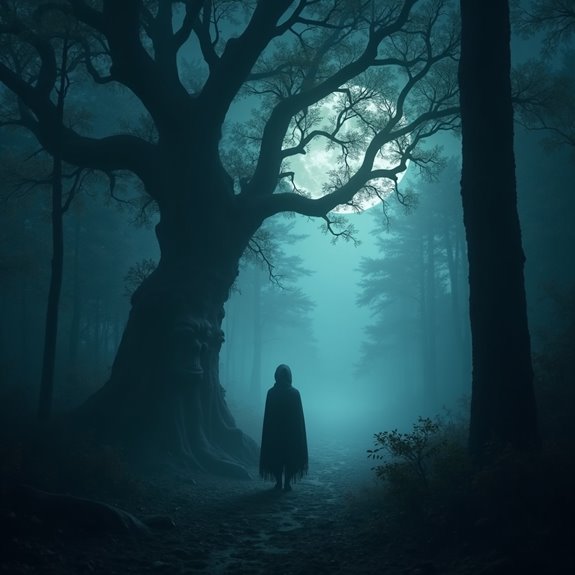Why Do So Many Myths Warn Against Looking Back?
Many myths caution against looking back, presenting tales filled with regret and loss. Characters like Orpheus and Lot’s wife demonstrate the perilous consequences of nostalgia and temptation. These narratives aren’t just stories; they reflect deep truths about the human experience and our relationship with time. But what deeper meanings lie beneath these warnings? Exploring the reasons for these cautionary themes may reveal insights about personal growth and resilience that resonate today.
Introduction

While many people believe that looking back can only lead to regret or nostalgia, the reality is often much more nuanced. Reflection allows individuals to learn from past experiences, recognize patterns, and appreciate growth. Through contemplation, they can derive valuable life lessons that inform their present decisions. Furthermore, looking back can foster connections; stories shared across generations create a rich tapestry of cultural identity. It doesn’t just evoke memories of what once was but can also ignite inspiration for what could be. The myths surrounding the act of reflecting often overlook its potential for personal development and collective understanding. Instead of shying away from the past, confronting it can strengthen resilience and inform a brighter future. Consequently, the narrative is far from simple.
Cautionary Tales in Ancient Cultures

Throughout history, ancient cultures have woven cautionary tales into their narratives, warning future generations about the consequences of certain actions. These stories, often embedded in mythology, emphasize the importance of heeding warnings and recognizing the pitfalls of human behavior. For instance, Greek myths frequently illustrate the repercussions of hubris, where characters face dire fates for overstepping mortal limits. Similarly, Egyptian lore often reflects the belief that ignoring divine guidance leads to chaos and misfortune. Whether through the tales of Orpheus or Lot’s wife, these narratives serve as reminders that looking back can hinder progress and cause regret. By reinforcing these lessons, ancient cultures sought to instill caution and encourage foresight in their communities.
Notable Cases or Sightings

Numerous notable cases and sightings throughout history have sparked fascination and debate around the concept of looking back. One intriguing instance is the tale of Orpheus, who lost his love, Eurydice, after glancing back at her while leading her from the Underworld. There’s also the famous story of Lot’s wife, who turned into salt for looking back at the burning city of Sodom. In modern times, witnesses have reported strange phenomena during moments of reflection, suggesting that looking back can evoke otherworldly experiences. These cases serve as reminders of the potential consequences tied to backward glances, reinforcing age-old warnings. Whether myth or reality, each story holds a cautionary lesson that continues to resonate today.
Common Theories or Explanations
As humans reflect on the past, several common theories emerge to explain the reasons behind the fascination with looking back. One theory suggests that nostalgia serves as a coping mechanism, helping individuals process unresolved emotions or trauma. Another perspective highlights the idea that memories shape identity; people often draw lessons from past experiences to navigate their present and future. Additionally, the concept of the “forbidden fruit” illustrates how curiosity about what’s left behind can lead to temptation and risk. Moreover, cultural narratives often link looking back with regret or fate, reinforcing the notion that dwelling on the past can hinder personal growth. These theories collectively underscore the complex human relationship with time and memory.
Frequently Asked Questions
What Psychological Effects Contribute to the Fear of Looking Back?
The fear of looking back stems from anxiety and regret. Individuals often worry about unresolved issues, past mistakes, or missed opportunities, which can lead to feelings of shame and hinder personal growth and progress.
Are There Modern Equivalents of These Ancient Myths?
Modern equivalents of ancient myths exist in stories like “The Great Gatsby” and movies like “Eternal Sunshine of the Spotless Mind,” where characters grapple with past regrets, signaling society’s ongoing struggle with nostalgia and its consequences.
How Do Different Cultures Interpret the Act of Looking Back?
Different cultures interpret looking back variably; some see it as essential for learning, while others view it as a distraction. In many traditions, it highlights nostalgia’s power, yet warns against being trapped by the past.
What Literary Works Explore the Theme of Looking Back?
Many literary works explore the theme of looking back, including Virgil’s “The Aeneid,” Homer’s “Odyssey,” and Gabriel García Márquez’s “One Hundred Years of Solitude.” Each reveals the complex emotions and consequences tied to reminiscing.
Can Looking Back Have Positive Implications in Some Narratives?
In some narratives, looking back can highlight personal growth, allowing characters to confront their pasts and learn valuable lessons. By reflecting, they gain insights, fostering resilience and ultimately driving their transformation into stronger individuals.


